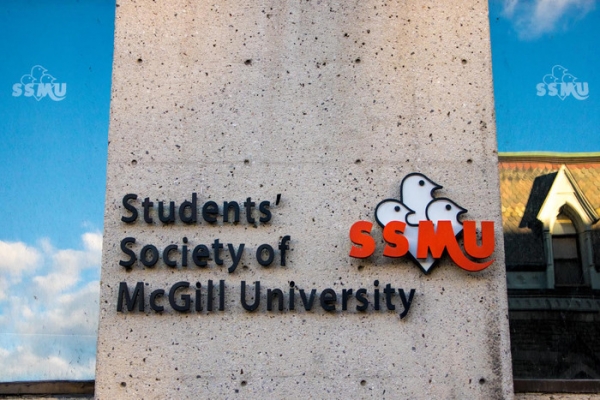The Students’ Society of McGill University (SSMU) convened on March 25 to vote on the Motion Regarding the Adoption of the Harm Reduction Policy and to receive notice of a motion regarding the BACoN-AToR Plan that touches on renaming the University Centre. Other notices included amendments to governance internal regulations, amendments to the internal regulations of finances, and readoption of the Equity Policy. The harm reduction policy calls to implement training for all SSMU groups so that they can apply principles of harm reduction, including promoting non-judgemental intervention education.
The three mandates of this policy comprise advocacy, SSMU operations, and accountability. The advocacy component encompasses bilateral collaboration between the Vice-President (VP) of University Affairs, the SSMU President, and the Association of McGill University Support Employees (AMUSE) to ensure completion of the mandates, and also mandates training for various student groups such as Greek letter organizations. The SSMU Operations section oversees events, clubs, and services to ensure they are following harm reduction principles, while the accountability section mandates officers appointed under this motion to deliver an annual report on the policy to the Legislative Council.
At the beginning of the meeting, the Legislative Council entered a confidential session to discuss the harm reduction motion. The vote to pass the motion did not pass by unanimous consent, leading to a debate.
Arts Representative Libby Williamson brought up a key point of contention throughout the debate of this motion: Its relation to Greek letter organizations. SSMU VP Student Life Maheen Akter expanded on the effects of this policy on Greek organizations.
“Well for one, it would [encourage] better trained Greek letter organizations, [resulting in] organizations that have more of a focus on harm reduction and reducing the pressure of drinking culture,” Akter said. “[The goal is to create] Greek organizations that promote harm reduction around substance use.”
Arts Counsellor Alex Karasick questioned Akter on whether Greek life organizations were consulted, and how this would work around pre-existing harm reduction efforts.
“I was wondering how this would build off any existing attempts at harm reduction that have been done by fraternities,” Karasick said. “I know the answer is that it varies a lot for each fraternity, but some I know have done things like say naloxone training and whatnot. How would this fit into the broader attempts that are also being done internally?”
According to Akter, Greek letter organizations were not consulted, but she believes that this motion is looking to implement a foundation to be built on.
“What we are trying to do with this motion to create a framework for Greek letter organizations to be aware that […] SSMU has a policy on harm reduction,” Akter said. “This is essentially meant to serve as a basis for any further training or harm reduction practices that Greek letter organizations want to implement within their organizations. This policy is not supposed to be a ‘be all end all’ for fraternities and sororities.”
Arts Representative Chip Smith emphasized the importance of consulting with other organizations on campus—such as the McGill Student Emergency Response Team (MSERT)—before passing motions that will affect them. Smith then proposed another motion to postpone voting on the Motion Regarding the Adoption of the Harm Reduction Policy until further consultation has been completed.
“There was very little consultation with relative entities,” Smith said. “I have also spoken to the president of Walksafe and have heard through Drivesafe as well that they were not consulted [on] this motion, despite being listed in this motion. ”
Smith’s motion to postpone voting on the harm reduction policy passed with 22 in favour, zero opposed, and zero abstentions.
Moment of the meeting:
SSMU President Jemark Earle brought forward a proposal through the Report of the Building and Operations Management Committee to have McGill students engage in a tech test trial. This test trial would install docks around campus that contain device chargers. Students would be able to take a charger, use it around campus, then re-dock it at any of the docking stations.
Soundbite:
“I have been around this for four years. I have seen this quite often. The Executive proposes these really good ideas for motions, but they are undercut by lack of consultation in areas that […] could have easily been put in. This is something we have seen especially this year. It is endemic to the Executive every year and […] we cannot be proceeding in good governance like this. We want a better environment for McGill students.”
—Arts Representative Chip Smith, on the importance of well-researched proposals.







